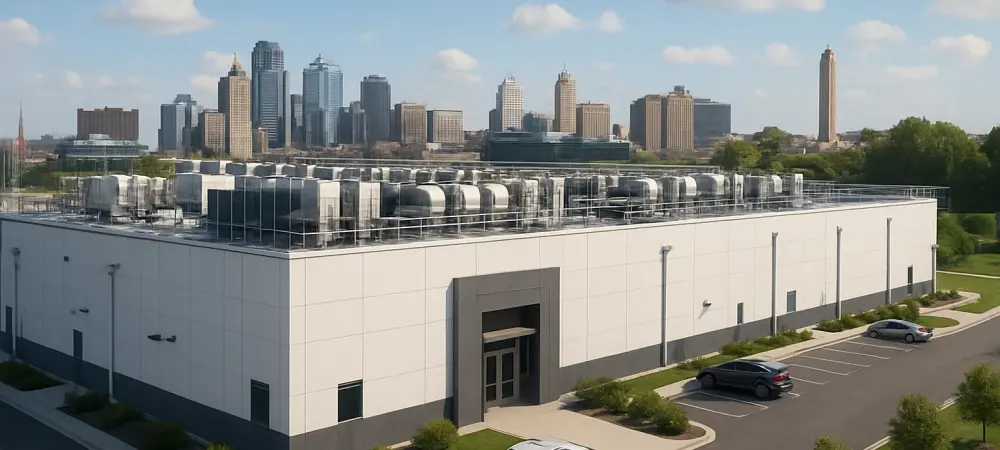What happens when a city rolls the dice on a $100 billion data center project, offering massive tax breaks to a shadowy tech titan, while its own residents wonder if they’ll be left holding the bag? In Kansas City, Missouri, a fierce debate rages over a development that could reshape the Northland region—or drain its resources. This isn’t just a local squabble; it’s a high-stakes gamble on economic growth that could set a precedent for cities nationwide chasing tech-driven prosperity.
The significance of this story lies in its broader implications. Dubbed Project Kestrel, this initiative by the Port Authority of Kansas City (Port KC) promises transformative growth through six sprawling data centers, yet it has sparked outrage over transparency and fairness. As municipalities across the U.S. wrestle with similar deals to lure big tech, Kansas City’s struggle offers a critical lens on balancing corporate incentives with community needs. This debate could shape how cities approach economic development for years to come.
The Mega Project Taking Shape in Northland
At the heart of the controversy is Project Kestrel, a colossal plan to build 1.8 million square feet of data centers across 379 acres in the KCI-29 industrial site in Kansas City’s Northland. Spearheaded by Port KC, the project’s first phase is slated to begin next year, with a completion timeline stretching over decades. The deal includes a 35-year tax abatement, a hefty incentive designed to attract a major global technology company—rumored to be Google, given its other regional investments.
Details remain scarce, fueling speculation and concern among locals. While Port KC touts the development as a cornerstone for digital innovation, the lack of a confirmed operator adds layers of uncertainty. Similar projects in the area, like Google’s reported $10 billion Project Mica with five data centers on 500 acres, suggest a pattern of tech giants expanding their footprint in the region, often with significant public subsidies.
Economic Dreams Clash with Local Realities
Proponents of the project paint a rosy picture of economic revival. Port KC argues that the data centers will bring high-value jobs, infrastructure improvements, and a surge in the digital economy. CEO Jon Stephens has emphasized the potential for workforce training programs, stating, “This isn’t just about buildings; it’s about laying the groundwork for prosperity that benefits everyone in Kansas City.”
Yet, not everyone shares this optimism. Critics highlight the cost to local services, pointing out that tax breaks of this magnitude could strain schools, roads, and emergency resources in the Northland. Platte County Presiding Commissioner Scott Fricker has been vocal in his opposition, warning that the deal prioritizes corporate gain over community welfare. The tension reflects a national trend—studies from the Economic Policy Institute show that data center projects often fall short on promised local employment, with many jobs going to out-of-state contractors.
A Community Caught in the Crossfire
Northland residents find themselves at the center of this storm, grappling with both hope and skepticism. Many express frustration over being kept in the dark about the project’s specifics, including the identity of the operator and the true impact of the tax abatement. Commissioner Fricker has tapped into this discontent, declaring, “It’s unacceptable to subsidize a wealthy corporation with massive tax breaks while our own people are left guessing about the consequences.”
This sentiment echoes experiences in other states where similar deals have unfolded. In Ohio, for instance, tax incentives for tech projects have led to public backlash when promised benefits failed to materialize for local communities. Kansas City’s situation raises a critical question: can a balance be struck between attracting industry giants and protecting the interests of everyday citizens?
Transparency and Trust Under Scrutiny
The lack of openness from Port KC has become a lightning rod in the debate. Critics argue that residents and local officials deserve clarity on how the tax abatement will affect public budgets, especially for essential services like education. Without hard data on job creation or economic returns, the project’s benefits remain speculative, heightening distrust among stakeholders.
Comparative cases add weight to these concerns. In Texas, tax incentive packages for data centers have sometimes resulted in minimal local gains, with municipalities later regretting the long-term revenue losses. For Kansas City, the opacity surrounding the deal risks eroding public confidence, making the need for accountability measures more urgent than ever.
Charting a Path Forward for Fair Development
Navigating this complex issue requires deliberate steps to ensure the project serves the broader community. One approach is mandating transparency from Port KC, compelling the release of detailed plans and the operator’s identity. Additionally, an independent cost-benefit analysis could shed light on whether projected gains in jobs and infrastructure outweigh the loss of tax revenue over 35 years. Community engagement also holds the key to bridging divides. Public forums could provide a platform for Northland residents to voice concerns and influence the project’s terms. Establishing clawback provisions—mechanisms to reclaim incentives if promises aren’t met—could further safeguard local interests. These strategies aim to transform a contentious deal into a model of equitable growth, setting a standard for other cities to follow.
Reflecting on a Divisive Chapter
Looking back, the debate over Kansas City’s major data center initiative revealed deep fault lines between economic ambition and local equity. It exposed how the allure of tech-driven growth often clashed with the practical needs of residents, leaving trust between officials and the community frayed. The sharp divide between Port KC’s optimism and critics like Commissioner Scott Fricker underscored a fundamental challenge in modern urban development.
Moving ahead, the focus shifted toward actionable solutions. Kansas City had the chance to lead by example, prioritizing transparency and community input in future deals. By insisting on rigorous evaluations and accountability, the city could ensure that such projects delivered real value to its people. This episode served as a reminder that progress, when pursued thoughtfully, had the power to unite rather than divide.

